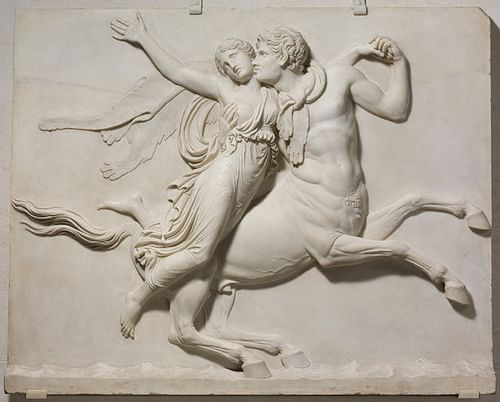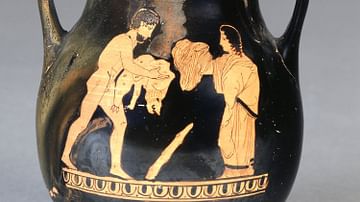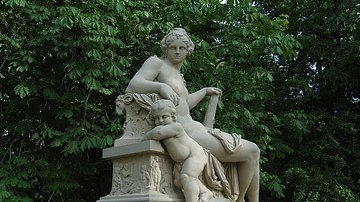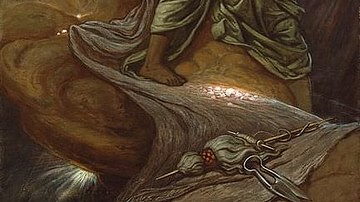
Deianira was the second wife of the Greek hero and demi-god Herakles (better known as Hercules, son of the god Zeus and the mortal woman Alcmene). She was the daughter of King Oeneus and Queen Althaea of Calydon. During the time of Hercules' famous Twelve Labors, he had taken a kind of side-adventure to sail with Jason and the Argonauts and, on this trip, met the hero Meleager, Oeneus' son. When Meleager was born, the Fates predicted that he would live until a log, presently burning in the family's hearth, was consumed. His mother instantly snatched the log from the fire, doused it with water, and hid it in a closet.
Many years later, after Meleager intentionally killed his brothers following the Calydonian Boar Hunt, Althaea, in her grief, retrieved the log, threw it into the fire, and Meleager died. Hercules later met the spirit of Meleager during his twelfth labor, when he went into the underworld to bring back the three-headed dog Cerberus who guarded the gates of Hades. Meleager told him he was troubled because his sister Deianira remained unwed on earth. He asked Hercules to return to the mortal plane and marry her so that she would not grow old and unloved in their father's house. Hercules promised the ghost that he would marry the woman if he were able to.
The Meeting of Deianira & Hercules
Once Hercules had completed his labors he then had further adventures, and whether he thought of Meleager and his request is never mentioned. There were certainly many other pressing events to occupy his mind. He killed Prince Iphitus of Oechalia and, to expiate this sin, sold himself as a slave to Queen Omphale who made him dress in women's clothes and do needlework with the ladies of the court.
Once Omphale set him free, he then embarked on further adventures such as the conquest of Troy, the war with the Titans, and a mission of revenge against King Augeias whom he felt had cheated him earlier by backing out of an agreement they had made. A number of years passed before Hercules came to Calydon and met Deianira.
Whether he remembered his promise to Meleager seems irrelevant, since he quickly fell in love with the beautiful princess who was so independent that she drove her own chariot and was adept in the arts of war. It also seems that Meleager did not have to worry about his sister's marital status, as she was of such beauty and charm that she had many suitors who wished to marry her. She was not interested in marrying any of them and, perhaps, was not even thinking of marriage until she fell in love with Hercules.
When Hercules declared his intentions, most of these suitors withdrew, but one of them, the river god Achelous, would not back down from the challenge of a mortal. He wrestled Hercules for Deianira's hand and would continually change shape just when Hercules' was on the point of winning. He finally changed himself into a bull and charged at Hercules who broke off one of his horns and would not return it until the god had capitulated, which he quickly did; Hercules and Deianira were then married.
The Marriage of Deianira & Hercules
The new couple lived happily for a time in Calydon until he accidentally killed his father-in-law's cupbearer. Although it was an accident, and he was forgiven by the king, Hercules could not forgive himself and so decided to leave the kingdom with Deianira. On their travels, they reached the river Evenus and there met the centaur Nessus who offered to carry Deianira across on his back. Upon reaching the other side, however, he tried to rape her and Hercules shot him with one of his arrows.
These were the same arrows Hercules had dipped in the blood of the nine-headed monster known as the Hydra during the second of his Twelve Labors in order to tip them with poison, as the Hydra's blood was extremely venomous. Nessus, therefore, was dying quickly as the poison pulsed through him, when he told Deianira that his blood possessed a special quality as a love potion, and that she should take some of it in a vial.
If ever she felt that Hercules might love another woman, he said, she should sprinkle the blood on his shirt and he would remain in love with Deianira forever, never even noticing other women. Nessus understood, of course, that his now-poisoned blood would be deadly to any mortal, and this was his revenge for Hercules' arrow.

Hercules and Deianira left Nessus' corpse by the river and traveled on. They settled in the city of Trachis, started a family, and, again, were happy for a time until Hercules went to war against Eurytus who, like Augeius, had insulted him earlier in life. He killed Eurytus and took his daughter Iole (whom he had won before in an archery contest but been refused his prize by Eurytus) as his concubine. Another version of the myth relates how he helped Artemis kill a boar which was ravaging the kingdom and was given Iole as a gift.
Hercules then prepared a victory feast and sent word to Deianira to send him his best shirt to wear at the festival. Deianira, fearing that Hercules was more fond of Iole now than of her, soaked the shirt in the blood of Nessus and then washed away the stains, leaving only the poison. As soon as Hercules put the shirt on, he was seized with agony and began to burn. He tore the shirt from his body, but the poison was already grafted to his skin.
Since he was a demi-god, he could not die quickly and so suffered as the poison penetrated his body, and he became weaker and weaker until, laying himself down on a funeral pyre he constructed, he died. His immortal part was taken by his father Zeus to dwell among the gods. Deianira, realizing she had been tricked by Nessus and had killed her husband, hanged herself.
Deianira in Literature
Her story is sympathetically told in the Greek playwright Sophocles' tragedy The Women of Trachis (written c. 450 BCE) and also by the Roman poet Ovid (43 BCE - c.14 CE) in his Heroides where one of the chapters is presented as a letter from Deianira to Hercules when he was away, expressing her love for him and asking when he might return to her.
She is also featured in the play Hercules Oetae'us (Hercules on Oeta) by the Roman playwright Seneca (also known as Seneca the Younger, 4 BCE-65 CE) where she is depicted as a vindictive and jealous woman who kills Hercules out of spite. Historians have questioned whether the play was actually written by Seneca but, whoever wrote it, they drew heavily on Sophocles' earlier work, keeping many of the same scenes and the same progression and only seriously departing from it in the character of Deianira.
This version of Deianira, though a much less sympathetic rendering of the story, is in keeping with the meaning of her name: "man-destroyer". Earlier versions of her story generally present her as unwittingly causing Hercules' death out of her love for him and as a sympathetic character who dies tragically.





